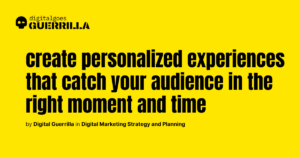Crafting an effective marketing strategy requires more than just creativity and effort. It demands precision, speed, and data-driven insights—qualities that artificial intelligence (AI) excels at delivering. Yet, many marketers remain unsure of how to fully leverage AI for strategy and planning.
This blog post dives deep into actionable ways AI can transform your digital marketing efforts, moving beyond basic automation to help you stay ahead of the competition.
Why AI Is a Game-Changer for Digital Marketing Strategy
AI in digital marketing isn’t just about chatbots or predictive text anymore. It’s about uncovering hidden insights, automating mundane tasks, and enabling hyper-personalized campaigns that resonate with your audience. For those struggling with manual data analysis, inconsistent campaign results, or simply the overwhelming complexity of multi-channel strategies, AI offers clarity and control.
How AI Drives Smarter Strategy and Planning
1. AI-Powered Customer Insights: Beyond the Surface
AI helps marketers understand their customers like never before. Tools like Google Analytics 4, Mixpanel, and AI-driven CRMs analyze customer behavior across platforms, providing nuanced segmentation that goes beyond demographics. AI can predict not just what your audience is doing now, but what they are likely to do next.
For instance, Netflix uses AI to recommend content based on viewing history and preferences. Similarly, you can use AI tools like HubSpot or Salesforce Einstein to predict customer behavior and tailor marketing messages accordingly.
Actionable Tip:
Integrate AI-powered customer insight tools into your strategy to uncover trends in customer preferences. Focus on predictive analytics to prepare for shifts in behavior.
2. AI for Content Strategy: Making Creativity Data-Driven
Crafting content that resonates requires deep audience understanding. AI tools like Clearscope and MarketMuse analyze top-performing content in your niche, identify gaps, and suggest topics that align with audience interests and search intent.
Real-world example: Sephora uses AI to understand which types of beauty tutorials perform best and adjusts its content strategy to match. This precision ensures that every piece of content has a purpose.
Actionable Tip:
Use AI tools to evaluate your current content library. Identify underperforming pieces, optimize them, and focus on producing content that ranks for your target keywords. Learn how to develop a content marketing strategy and should it be platform-based or platform-adjusted?
3. Automating Campaign Optimization: Work Smarter, Not Harder
AI can monitor and optimize campaigns in real time, ensuring every dollar spent delivers maximum ROI. Platforms like Google Ads leverage AI to automate bidding strategies, while email marketing tools like Mailchimp predict the best times to send messages based on user engagement patterns.
Take Coca-Cola as an example: its AI-driven campaigns analyze data points like weather patterns and purchasing behavior to deliver hyper-targeted ads.
Actionable Tip:
Enable automated bidding in your paid ad campaigns. Use tools like Optmyzr or Adzooma to further enhance campaign performance with AI-powered recommendations. Also check how to plan a digital marketing campaign in general.
4. Sentiment Analysis: Tapping Into the Voice of the Customer
AI tools like MonkeyLearn or Lexalytics analyze social media, reviews, and survey data to gauge public sentiment about your brand. This helps you pivot your strategy in real-time and address negative feedback before it escalates.
Advanced Insight:
During a product launch, sentiment analysis can detect early reactions and suggest changes to messaging or targeting to ensure success.
5. AI in Scenario Planning and Risk Mitigation
AI can model various “what-if” scenarios for your marketing plans. Tools like Tableau or Microsoft Power BI integrate AI to simulate outcomes based on different variables, enabling you to make decisions with confidence.
Actionable Tip:
Use AI simulations during budget allocation to test potential outcomes. Allocate resources to channels and strategies with the highest predicted ROI. Read how to use ai in crisis management.
The Tools You Need to Get Started
Here’s a quick guide to some top AI tools for digital marketing strategy:
- Predictive Analytics: IBM Watson, Salesforce Einstein
- Content Optimization: MarketMuse, SEMrush, Clearscope
- Sentiment Analysis: MonkeyLearn, Lexalytics
- Campaign Management: Google Ads AI, Optmyzr, Adzooma
- Data Visualization: Tableau, Power BI
Each of these tools offers unique benefits, but the key is to choose those that align with your specific business goals.
Frequently Asked Questions
Q1: Can small businesses afford to implement AI in their strategy?
Yes, many AI tools are scalable and offer affordable plans. Start with tools like Canva for design or Mailchimp for email automation.
Q2: Will AI replace human marketers?
No. AI enhances decision-making but still relies on human creativity and oversight.
Q3: How do I measure the ROI of AI in marketing?
Track metrics like conversion rates, campaign efficiency, and customer acquisition costs pre- and post-AI implementation.
Conclusion: Start Your AI Journey Today
AI is not just a buzzword; it’s a transformative tool that can elevate your digital marketing strategy from good to great. Whether it’s uncovering customer insights, optimizing campaigns, or preparing for future trends, AI offers unmatched advantages. Start small, experiment with tools, and watch as AI empowers you to create data-driven strategies that resonate with your audience and deliver measurable results.
Read more about Strategy and Planning in Digital Marketing:
- Why Growth Marketing Matters More Than Ever?
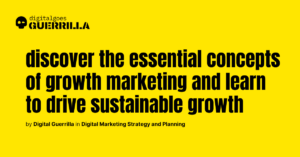
- Last-Minute Marketing Tips for a Successful Black Friday and Cyber Monday
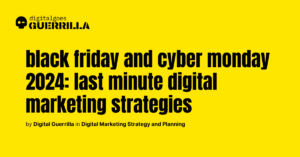
- How to identify the most relevant channels for your target audience?
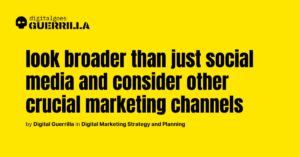
- How to establish benchmarks effectively and boost results?
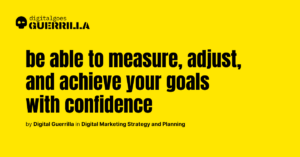
- How to plan a digital marketing campaign?
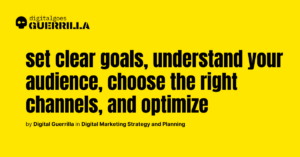
- How to use geotargeting in digital marketing?
